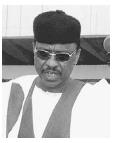NIGER
Mamadou Tandja
Head of State

(pronounced "MA-ma-dou TAN-ja")
"This victory is the victory of all the Nigerien people, of democracy, and of political, social, and institutional stability for a new beginning."
The Republic of Niger, the largest nation in West Africa, occupies an area of 1,267,000 sq km (489,191 sq mi). It shares borders with seven other countries: Libya and Algeria to the north, Chad to the east, Nigeria and Benin to the south, and Burkina Faso and Mali to the west. Two-thirds of the country is desert, and most of the northeast is uninhabitable.
The population of Niger was estimated at 10.6 million in 2002. That number is expected to reach 20 million by 2015, adding more strain to the already limited food and water resources. Approximately 53% of the people belong to the Hausa ethnic group, with Djerma Songhai peoples making up 22%, and Tuareg and Fulbe, 10% each. French is the official language. The people of Niger are predominantly Muslim (estimated at 85–90% of the population); some Christianity and traditional animism is also practiced.
The vast majority of the people make their living from agriculture. Peanuts, cowpeas, cotton, and livestock are the primary export products. In addition, hides and skins and uranium are important sources of foreign exchange. Niger is consistently ranked as one of the poorest countries in the world. The gross domestic product (GDP) was estimated in 2001 at US $820 per head. The currency unit is the Communauté Financière Africaine (CFA) franc , with 760 francs = US $1.00.
ADDRESS
Office of the President
Niamey, Republic of Niger
Comment about this article, ask questions, or add new information about this topic: